In "Beyond Good and Evil," Friedrich Nietzsche challenges the underpinnings of traditional morality, offering a penetrating critique of established philosophical doctrines. The book diverges from Nietzsche's earlier work, "Thus Spoke Zarathustra," by employing a more aphoristic style, which allows for nuanced exploration of complex ideas. Through subtle prose and provocative assertions, Nietzsche dissects the duality of morality, asserting that the dichotomy of good versus evil stifles individual creativity and authentic existence. Positioned within the larger context of 19th-century European philosophy, this work serves as a cornerstone for modern existential and postmodern thought, inviting readers to rethink the foundations of moral judgment. Friedrich Nietzsche, a prominent figure in the realm of philosophy, was deeply influenced by the cultural and intellectual currents of his time, including the rise of scientific rationalism and the decline of traditional religious values. His experiences of illness and isolation further catalyzed his philosophical inquiries, leading him down the path of radical skepticism that permeates "Beyond Good and Evil." Nietzsche's work embodies a profound struggle against nihilism, seeking to redefine values through the lens of individual perspective and will. Readers seeking to engage with the provocative ideas of modern philosophy will find "Beyond Good and Evil" essential. It not only invites profound self-reflection but also challenges societal norms, making it an indispensable text for those eager to explore the intricacies of morality, power, and the human condition. Nietzsche's powerful prose and insightful critiques make for a compelling read, ensuring the book's relevance to contemporary philosophical discourse.
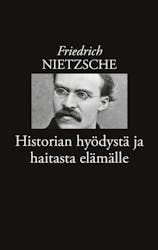
Historian hyödystä ja haitasta elämälle
Friedrich Nietzsche
book
Näin puhui Zarathustra
Friedrich Nietzsche
audiobookbook
150 Classics You Should Read Before You Die : Romeo and Juliet, Emma, Vanity Fair, Middlemarch, Tom Sawyer, Faust, Notre Dame de Paris, Dubliners, Odyssey
William Shakespeare, John Milton, Jonathan Swift, Daniel Defoe, Henry Fielding, Laurence Sterne, Jane Austen, William Makepeace Thackeray, P. B. Shelley, Mary Shelley, John Keats, Charlotte Brontë, Emily Brontë, Anne Brontë, George Eliot, Charles Dickens, Thomas Hardy, Elizabeth von Arnim, D. H. Lawrence, Ann Ward Radcliffe, Bram Stoker, Arthur Conan Doyle, Joseph Conrad, Oscar Wilde, Lewis Carroll, Frances Hodgson Burnett, C. S. Lewis, George Weedon Grossmith, H. G. Wells, Willkie Collins, G. K. Chesterton, E. M. Forster, T. S. Eliot, James Joyce, George Bernard Shaw, W. B. Yeats, Sir Walter Scott, Robert Louis Stevenson, Kenneth Grahame, George MacDonald, J. M. Barrie, Mark Twain, Jack London, Herman Melville, Nathaniel Hawthorne, Louisa May Alcott, Willa Cather, Edith Wharton, Kate Chopin, Henry David Thoreau, Walt Whitman, Kahlil Gibran, Harriet Beecher Stowe, Frederick Douglass, James Fenimore Cooper, Henry James, Edgar Allan Poe, H. P. Lovecraft, Lewis Wallace, L. M. Montgomery, Homer, Apuleius, Marcus Aurelius, Johann Wolfgang von Goethe, Herman Hesse, Friedrich Nietzsche, Jules Verne, Marcel Proust, Victor Hugo, Gustave Flaubert, Gaston Leroux, Honoré de Balzac, Stendhal, Plato
book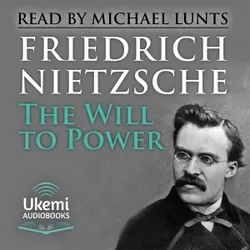
The Will to Power : An Attempted Transvaluation of All Values
Friedrich Nietzsche
audiobook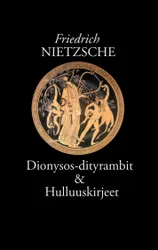
Dionysos-dityrambit
Friedrich Nietzsche
book
Beyond Good and Evil : Unveiling Nietzsche's Revolutionary Philosophy
Friedrich Nietzsche, Zenith Crescent Moon Press
book
The Greatest Literary Classics Of All Time : 150 Books: Romeo and Juliet, Emma, Vanity Fair, Middlemarch, Tom Sawyer, Faust, Notre Dame de Paris…
Johann Wolfgang von Goethe, Stendhal, Jules Verne, Gustave Flaubert, Lewis Carroll, Theodor Storm, Henrik Ibsen, Charles Dickens, Plato, Honoré de Balzac, Mark Twain, Harriet Beecher Stowe, Rabindranath Tagore, Fyodor Dostoyevsky, Walt Whitman, Niccolò Machiavelli, Oscar Wilde, Robert Louis Stevenson, James Fenimore Cooper, Edgar Allan Poe, William Shakespeare, Giovanni Boccaccio, Confucius, George MacDonald, Bram Stoker, Charlotte Brontë, Anne Brontë, Emily Brontë, Henry David Thoreau, Jack London, Henry James, Louisa May Alcott, Victor Hugo, Arthur Conan Doyle, Frances Hodgson Burnett, Joseph Conrad, Jane Austen, Herman Melville, George Eliot, Laurence Sterne, Thomas Hardy, Jonathan Swift, Edith Wharton, Benito Pérez Galdós, Daniel Defoe, Henry Fielding, Alexandre Dumas, Rudyard Kipling, William Dean Howells, Kalidasa, Kenneth Grahame, Marcel Proust, Washington Irving, Juan Valera, Willa Cather, Nathaniel Hawthorne, Homer, Gaston Leroux, Charles Baudelaire, William Makepeace Thackeray, Voltaire, Kate Chopin, Apuleius, John Milton, Charlotte Perkins Gilman, Frederick Douglass, Laozi, John Keats, James Joyce, Ann Ward Radcliffe, Kahlil Gibran, Kakuzo Okakura, Soseki Natsume, Princess Der Ling, L. Frank Baum, H. G. Wells, W. B. Yeats, J. M. Barrie, G. K. Chesterton, T. S. Eliot, L. M. Montgomery, C. S. Lewis, D. H. Lawrence, E. M. Forster, H. P. Lovecraft, F. Scott Fitzgerald, Marcus Aurelius, Friedrich Nietzsche, Lewis Wallace, Ivan Turgenev, Anton Chekhov, Leo Tolstoy, Nikolai Gogol, Sir, George Bernard Shaw, Miguel de Cervantes, Mary Shelley, Cao Xueqin, Emile Zola, Válmíki, Bankim Chandra Chatterjee, P. B. Shelley, Elizabeth von Arnim, Herman Hesse, Dante, Pedro Calderon de la Barca, Sun Tzu, Inazo Nitobé, George Weedon Grossmith, Willkie Collins
book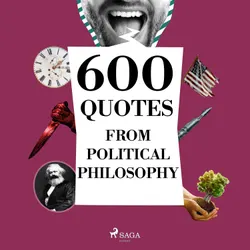
600 Quotes from Political Philosophy
Cicero, Confucius, Alexis de Tocqueville, Karl Marx, Friedrich Nietzsche, Henry David Thoreau
audiobook
3500 Final Quotes
Marcus Aurelius, Jane Austen, Beaumarchais, Napoleon Bonaparte, Buddha, Winston Churchill, Cicero, Confucius, Nicolas de Chamfort, Charles de Gaulle, Antoine de Saint-Exupéry, Denis Diderot, Fyodor Dostoevsky, Albert Einstein, Ralph Waldo Emerson, Anne Frank, Mahatma Gandhi, Immanuel Kant, Søren Kierkegaard, Martin Luther King, Georg Christoph Lichtenberg, Abraham Lincoln, Montesquieu, Friedrich Nietzsche, Plato, Marcel Proust, Arthur Schopenhauer, William Shakespeare, Socrates, Baruch Spinoza, Henry David Thoreau, Leonardo da Vinci, Voltaire, Oscar Wilde, Lao Zi
audiobook
The Twilight of the Idols
Friedrich Nietzsche
audiobookbook
David Strauss uskontunnustajana ja kirjailijana
Friedrich Nietzsche
book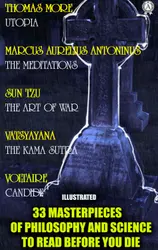
33 Masterpieces of Philosophy and Science to Read Before You Die (Illustrated) : Utopia, The Meditations, The Art of War, The Kama Sutra, Candide
Thomas More, Marcus Aurelius Antoninus, Sun Tzu, Vatsyayana, Voltaire, Edwin A. Abbott, Aristotle, Dale Carnegie, Gilbert Keith Chesterton, René Descartes, Epictetus, Sigmund Freud, Hermann Hesse, David Hume, Lao Tzu, David Herbert Lawrence, Niccolò Machiavelli, John Mill, Prentice Mulford, Friedrich Nietzsche, Plato, Bertrand Russell, H.G. Wells, Frances Bacon
book
